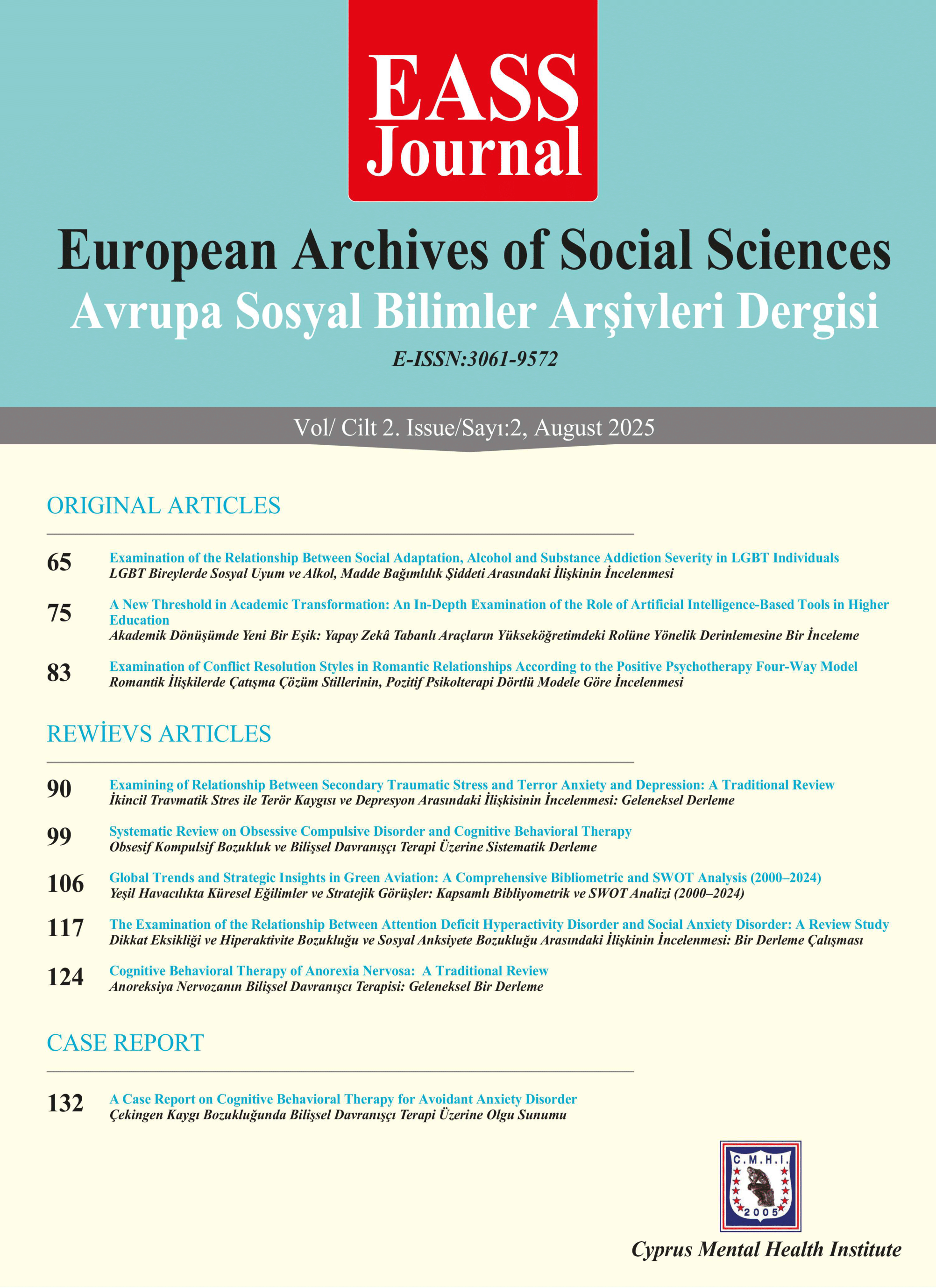Systematic Review on Obsessive Compulsive Disorder and Cognitive Behavioral Therapy
DOI:
https://doi.org/10.35365/eass.25.02.05Keywords:
Obsessive Compulsive Disorder, CBT, Systematic CompilationAbstract
This study aims to investigate the application of Cognitive Behavioral Therapy (CBT) to individuals with Obsessive Compulsive Disorder (OCD). The study was conducted using the systematic review method. No field work was conducted and no scale was used. The studies examined in Turkish and English were conducted between 2017 and 2023. This review was conducted in two stages in March 2025 and May 2025. The results obtained show that OCD symptoms are significantly reduced and in some cases completely eliminated with CBT. It was also determined that CBT reduces individuals' anxiety levels, increases their functionality, and improves their ability to cope with obsessive thoughts. The reviewed sources show that CBT applied both individually and in groups yields positive results in the treatment of OCD. As a result, CBT stands out as an effective psychotherapy method that is widely used in the treatment of OCD, is based on scientific foundations, and can provide permanent improvement in the long term. This review strengthens the role of CBT in the treatment of OCD and provides a basis for future clinical research.
References
American Psychiatric Association. (1952). Diagnostic and statistical manual of mental disorders (1st ed.). Washington, DC: Author.
American Psychiatric Association. (1968). Diagnostic and statistical manual of mental disorders (2nd ed.). Washington, DC: Author.
American Psychiatric Association. (1994). Diagnostic and statistical manual of mental disorders (4th ed.). Washington, DC: Author.
American Psychiatric Association. (2013). Diagnostic and statistical manual of mental disorders (5th ed.). Washington, DC: Author.
Beck, A. T. (1976). Cognitive therapy and the emotional disorders. International Universities Press.
Dobson, K. S., & Dozois, D. J. (2019). Handbook of cognitive-behavioral therapies (4th ed.). Guilford Publications.
Durmuş, H. T. (2022). Obsesif kompulsif bozukluk ve dissosiasyon birlikteliği; dissosiyatif-OKB alt tipinin OKB’den ayrıştırılması (Yüksek lisans tezi). Kahramanmaraş Sütçü İmam Üniversitesi, Kahramanmaraş.
Foa, E. B., Franklin, M. E., & Moser, J. (2005). Context in cognitive-behavioral treatment of obsessive-compulsive disorder. Psychological Bulletin, 131(4), 495–519.
Freud, S. (1913/1997). Saplantı nevrozuna yatkınlık (Nevroz seçimi sorununa bir katkı) [Obsessive neurosis]. In S. Budak (Trans.), Psikopatoloji üzerine (pp. 125–143). Öteki Yayınları.
Karamustafalıoğlu, K. O. (2010). Obsesif kompulsif bozukluk. The Journal of Turkish Family Physician, 1(1), 1–10.
Katz, D. E., Rector, N. A., McCabe, R. E., Hawley, L. L., Rowa, K., Richter, M. A., Ornstein, T., Regev, R., McKinnon, M., & Laposa, J. M. (2023). Effects of aerobic exercise alone and combined with cognitive-behavioral therapy on obsessive-compulsive disorder: A randomized controlled trial.
Lundström, L., Flygare, O., & Andersson, E. (2022). Effects of internet-based versus face-to-face cognitive behavioral therapy in adults with obsessive-compulsive disorder: A randomized clinical trial.
Meng, F. Q., & Han, H. Y. (2019). Efficacy of medication combined with cognitive-behavioral therapy for obsessive-compulsive disorder: A multicenter randomized controlled trial in China. Journal of Affective Disorders, 253, 184–192.
Meyer, V. (1966). Modification of expectations in cases with obsessional rituals. Behaviour Research and Therapy, 4(4), 273–280.
Öneker, T. (2017). OKB tanısı almamış yetişkinlerde obsesif-kompulsif belirtilerin ve belirti şiddetlerinin cinsiyet açısından dağılımının incelenmesi (Yüksek lisans tezi). Sosyal Bilimler Enstitüsü.
Page, M. J., McKenzie, J. E., Bossuyt, P. M., Boutron, I., Hoffmann, T. C., Mulrow, C. D., ... & Moher, D. (2021). The PRISMA 2020 statement: An updated guideline for reporting systematic reviews. BMJ, 372, n71.
https://doi.org/10.1136/bmj.n71
Schröder, J., Werkle, N., Cludius, B., Jelinek, L., Moritz, S., & Ostermann, S. (2020). Unguided internet-based cognitive-behavioral therapy for obsessive-compulsive disorder: A randomized controlled trial. Depression and Anxiety, 37(12), 1208–1220.
Salkovskis, P. M. (1999). Understanding and treating obsessive–compulsive disorder. Behaviour Research and Therapy, 37, S29–S52.
Tatar, C. (2020). Obsesif kompulsif bozukluğa sahip hastalar ile psikiyatrik tanısı bulunmayan bireyler arasında duygusal yeme düzeylerinin karşılaştırılması (Yüksek lisans tezi). Sosyal Bilimler Enstitüsü.
Ünyeli, İ. B. (2015). Obsesif kompulsif bozukluk tanısı alan ebeveynlerin 10–18 yaş çocuklarında anne babadan algılanan psikolojik kontrol ve mükemmeliyetçilik düzeyi (Yüksek lisans tezi). Beykent Üniversitesi, Sosyal Bilimler Enstitüsü, Klinik Psikoloji Bilim Dalı, İstanbul.
Yılmaz, B. (2018). Obsesif kompulsif bozukluk tedavisinde güncel yaklaşımlar. Lectio Scientific, 2(1), 21–42.
Downloads
Published
How to Cite
Issue
Section
License
Copyright (c) 2025 Çisem Ekiz

This work is licensed under a Creative Commons Attribution 4.0 International License.









 The journal is licensed under a
The journal is licensed under a 